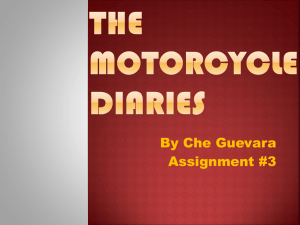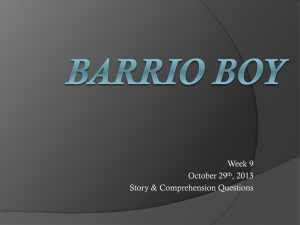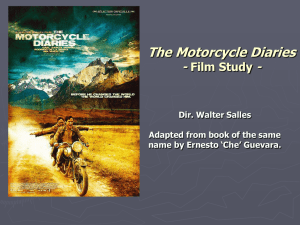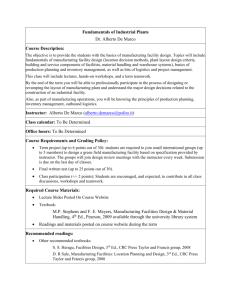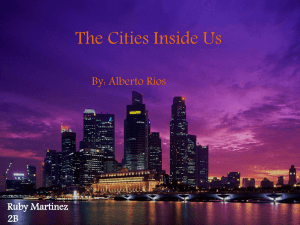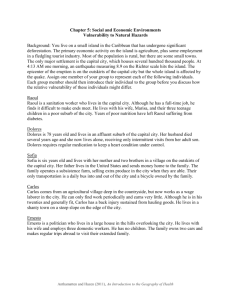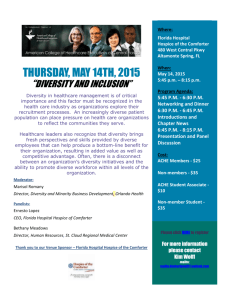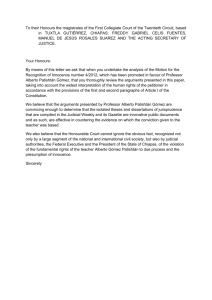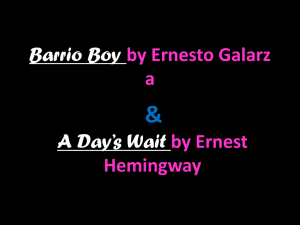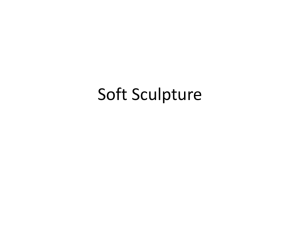THE MOTORCYCLE DIARIES
advertisement
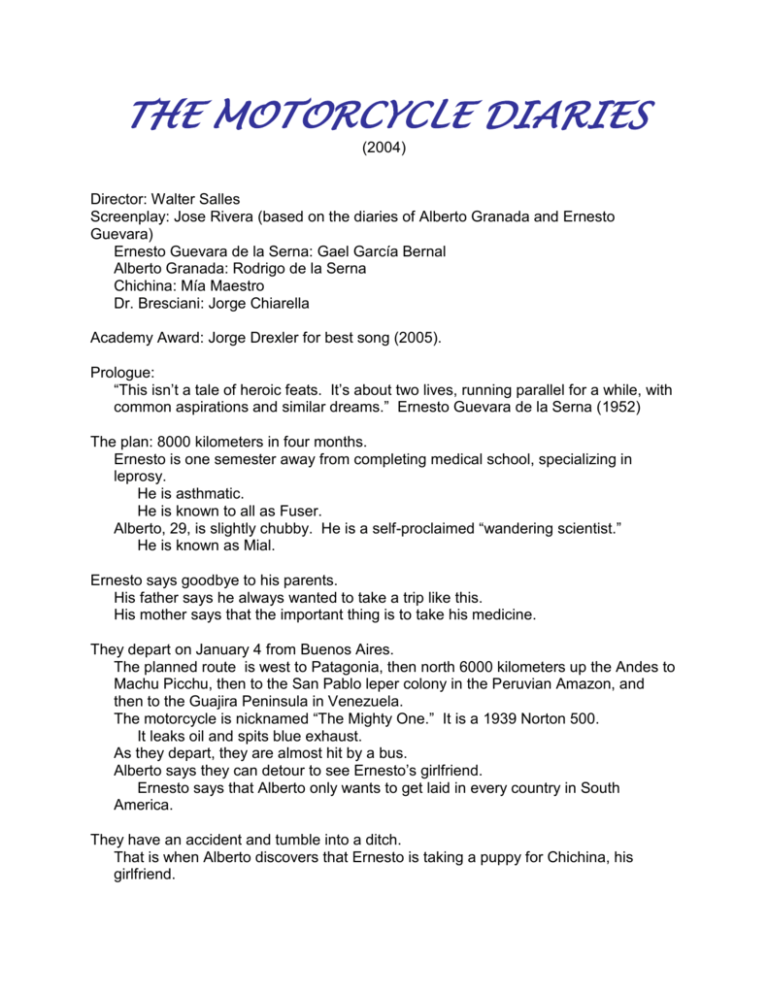
THE MOTORCYCLE DIARIES (2004) Director: Walter Salles Screenplay: Jose Rivera (based on the diaries of Alberto Granada and Ernesto Guevara) Ernesto Guevara de la Serna: Gael García Bernal Alberto Granada: Rodrigo de la Serna Chichina: Mía Maestro Dr. Bresciani: Jorge Chiarella Academy Award: Jorge Drexler for best song (2005). Prologue: “This isn’t a tale of heroic feats. It’s about two lives, running parallel for a while, with common aspirations and similar dreams.” Ernesto Guevara de la Serna (1952) The plan: 8000 kilometers in four months. Ernesto is one semester away from completing medical school, specializing in leprosy. He is asthmatic. He is known to all as Fuser. Alberto, 29, is slightly chubby. He is a self-proclaimed “wandering scientist.” He is known as Mial. Ernesto says goodbye to his parents. His father says he always wanted to take a trip like this. His mother says that the important thing is to take his medicine. They depart on January 4 from Buenos Aires. The planned route is west to Patagonia, then north 6000 kilometers up the Andes to Machu Picchu, then to the San Pablo leper colony in the Peruvian Amazon, and then to the Guajira Peninsula in Venezuela. The motorcycle is nicknamed “The Mighty One.” It is a 1939 Norton 500. It leaks oil and spits blue exhaust. As they depart, they are almost hit by a bus. Alberto says they can detour to see Ernesto’s girlfriend. Ernesto says that Alberto only wants to get laid in every country in South America. They have an accident and tumble into a ditch. That is when Alberto discovers that Ernesto is taking a puppy for Chichina, his girlfriend. MOTORCYCLE DIARIES They arrive at the luxurious resort, Miramar—like a massive Swiss chalet—on 13 January 1952, after covering 601 km. Chichina and the guests are upper class—very rich. There is a dance. Ernesto does not dance well. Chichina tries to teach him. Alberto dances well and dances with Chichina and other pretty young women. Chichina and Ernesto talk about whether she will wait for him. She says, finally, “I will wait for you, but don’t take forever.” Ernesto and Alberto stay six days. They approach the Andes on a narrow dirt road. They have a flat and change the tire. In the process, Ernesto accidentally flashes some paper money. It is $15 Chichina has given him to buy her a bathing suit if they make it to the U.S. Ernesto says the money is off limits. Piedra del Aguila, 29 January, km 1809 They spin out on a rough dirt road. Ernesto gets a nasty gash in his leg. They try to set up camp in a wind storm. Their tent blows away. They seek shelter from a rancher, claiming to be doctors doing research. The rancher lets them sleep in a shed with “the migrants.” San Martín de los Andes, 31 January, km 2051 They stop at a house, claiming to be doctors. The man asks them to look at a mysterious lump on his neck. Alberto says it’s nothing serious. Ernesto says the man has a cancerous tumor. Later, Alberto criticizes him for telling the truth because they couldn’t help the man and the important thing was to get more hospitable treatment from the man and his wife. The next day they go hunting for food at a lake. Ernesto’s father had given him a handgun on the day of departure. Alberto uses it to shoot a duck, which falls into the lake. They argue about who should swim to fetch it. Ernesto does. That night he suffers a terrible asthma attack that lasts three days. Estacíon de Tren de Bariloche, Argentina, km 2270 Lagos Frías, Argentina, 15 February, km 2306 They cross into Chile on a ferry across a beautiful lake. They discuss coming back to the lake to set up a clinic that would treat everyone. 2 MOTORCYCLE DIARIES 3 In the mountains, they encounter snow and slippery roads. They have to push the motorcycle. Temuco, Chile, 18 February, km 2772 They push the motorcycle, and argue about money and Chichina. As they enter Temuco, Alberto says, “You know what your problem is, Fuser? Your fucking honesty. You could help out with a little lie once in a while.” Ernesto enters the offices of the Austral News, a local newspaper. The next day, the Austral News prints a feature story about them, greatly exaggerating their qualifications and experience as medical doctors—based on Ernesto’s lies. A mechanic says he will fix their motorcycle, after being shown the article in the Austral News. They stay in town to attend a dance that evening. Alberto dances with all the girls. Ernesto dances with the mechanic’s attractive wife. She is trying to seduce him. She asks him to dance. He says no, but agrees if she will teach him. She asks him to “step out” for a break, but sees her drunken husband at the bar and changes her mind. She trips and falls, blaming her fall on Ernesto. The husband breaks a bottle of beer and comes after him. The husband and others chase them from the dancehall. They escape on the repaired motorcycle. They encounter a herd of cows on the road. They hit one and take a tumble. The brakes don’t work. The motorcycle is broken again. [Nothing is mentioned about the cow.] They catch a ride with a farmer’s truck. Los Angeles, Chile, 26 February, km 2940 In the town, they meet two young women, Jazmín and Daniela, in a café. The women buy them a bottle of wine. They say that they can’t drink on an empty stomach, according to Argentine custom. The women buy them food. As they are about to see the town, guided by Jazmín and Daniela, a man (Moncho) approaches Ernesto and begs him to look at an old woman (his mother?). He gives her some pills and instructions. But he knows she will die soon. The mechanic says “The Mighty One” cannot be fixed. It could be sold for scrap. MOTORCYCLE DIARIES 4 They continue on foot, hitchhiking. A truck stops for them. Valparaíso, 7 March, km 3573 Ernesto reads a letter from Chichina. He won’t say what it says, but it is obviously bad news. He reads the letter over and over. Desierto de Atacama, 11 March, km 4960 Alberto complains about the heat, but Ernesto insists on pressing on. Nightfall: They camp with a couple who lost their farm to a speculator. Police chased the couple because they are communists. The couple asks why Ernesto and Alberto are traveling. E and A respond that they just wanted to travel. The couple finds that difficult to understand. Ernesto writes: “Their faces were tragic and haunted. They told us of comrades who had mysteriously disappeared and were said to be somewhere at the bottom of the sea. It was one of the coldest nights of my life, but also one which made me feel closer to this strange, for me anyway, human race.” Mina de Chaquicantu, 15 March, km 5122 Mine bosses pick out workers for the day. The man in the couple is chosen to work. Ernesto tells a boss to give the workers water. He nearly gets into a fight. The boss tells him he is trespassing on Anaconda Mining Company property. They continue into the Peruvian Andes. Alberto collapses. Cuzco, 2 April, km 6932 They meet a boy (aged 12-15) who serves as their guide. They talk at a market with some peasant women. Most speak only Quechua, but one translates for the others. Times are hard. Jobs are scarce. They chew coca leaves with the women. Ernesto talks with an indigenous peasant who has been fired and thrown off the land where he was working. The land was productive, but the landlord threw the peasants off. He says, “I can’t live in the past. I have to move on, work, find the money to educate my kids.” He says that the peasants are organized. MOTORCYCLE DIARIES 5 Machu Picchu, 5 April, km 7014 The Incas knew astronomy, brain surgery, and mathematics…. But the Spanish had gunpowder. Alberto suggests that he and Ernesto start an indigenous party to carry on the revolution of Tupac Amaru. Ernesto responds, “A revolution without guns? It would never work, Mial.” Lima, Perú, 12 May, km 8198 They ask directions to Mercaderes Street. When they get there, they steal two bottles of milk. Dr. Hugo Pesce, Director of Perú’s leper treatment program, sees them and invites them into his office. He has an extensive library. Ernesto writes, “He gave us clothes, food, money, and ideas.” Ernesto reads a book about indigenous revolution. Pesce tells them that they are idealists and that they will find something important in San Pablo. He gives them the manuscript of his novel, asking them to read it. Pucallpa, Perú, 25 May, km 8983 Pesce has given them clothes, and he buys tickets on an Amazon River ferry. He asks E and A for their opinion of his manuscript as they depart. Alberto says it is great. Ernesto says it is awful, trite, and unreadable. Pesce is disappointed but says that no one has been as honest with him as Ernesto has been. On the river ferry, Ernesto has another asthma attack. It alarms other passengers Alberto provides adrenalin. Ernesto slowly recovers his breath. Alberto thanks a young woman, Luz, for her help during Ernesto’s attack. She is a prostitute. Alberto begs Ernesto for the $15 from Chichina so that he can have Luz. But Ernesto has given it to the couple at the mine. Alberto plays blackjack and wins. He spends it on Luz. San Pablo, Perú, 8 June, km 10,223 Dr. Bresciani shows them around and explains the leper colony layout. The Amazon runs through the middle of it: the hospital is on the south side; the staff quarters are on the north side. There are 600 patients from all over South America. MOTORCYCLE DIARIES Bresciani tries to persuade Ernesto and Alberto to wear gloves when they are with patients. They decline to do so. The patients appreciate it. But the mother superior, Sor Alberto, is incensed that they don’t follow the rules. A patient, Silvia, does not want the surgery that would save her arm. Ernesto approaches her. They talk about how hard life is. He begins breathing hard. She asks him what is wrong. He says he was born with bad lungs. Silvia doesn’t like living. Ernesto: “You gotta fight for every breath, and tell death to go to hell.” Ernesto and Alberto have a chat. Ernesto: “Have you seen the river? … It segregates the ill from the healthy.” Silvia has the surgery. Ernesto treats a leper’s ankle. He tells the patient to wear sneakers the next time he plays soccer—and to be sure to invite him. Ernesto and Alberto help to construct a thatch roof. There is a nighttime concert of indigenous music. During a soccer game with patients and staff, Ernesto plays for the patients’ side. At the Sunday meal, Sor Alberto refuses to feed Ernesto and Alberto because they didn’t attend mass. Patients bring them food. 14 June: a dance party at the colony. Alberto dances with a nun. Ernesto finds a pretty young woman. They dance, but he is terrible. It’s a mambo, not a tango. Even the nuns laugh at him. Everyone sings happy birthday to Ernesto. Bresciani salutes Ernesto and Alberto for their enthusiasm and good work during three weeks at San Pablo. Ernesto makes a toast to Perú and to a united America. Ernesto wants to celebrate his birthday on the other side of the Amazon with the patients. But the boat is on the other side. 6 MOTORCYCLE DIARIES Ernesto dives in. Alberto warns him that no one can do it and that he will be eaten by the animals living in the river. No one has ever successfully swum the river at that place. People gather on the banks to watch. Ernesto is breathing harder and harder. He makes it and is greeted by the patients. In the morning, in heavy fog, Ernesto is warmly sent off by patients and staff. Cerca de Leticia, Colombia, 22 June, km 10,240 Caracas, Venezuela, 26 July, km 12,425 – airport Ernesto tells Alberto that something has happened to him on the trip. He noticed the injustice in the world and the kindness of others. They hug and part. Alberto calls him back. “My birthday is not April 12. It’s August 8. I just said that to motivate us.” Ernesto boards the plane. It takes off while Alberto watches. Ernesto recites a closing soliloquy, which repeats the movie’s opening lines: “This isn’t a tale of heroic feats. It’s about two lives running parallel for a while, with common aspirations and similar dreams. Was our dream too narrow, too biased, too hasty? Were our conclusions too rigid? Maybe. Wandering around our America has changed me more than I thought. I am not me anymore. At least I’m not the me I was.” This is followed by photos of poor workers, peasants, shopkeepers, and people in markets. Postscript: It took eight years for Ernesto and Alberto to meet again. In 1960 Granada was invited to live and work in Cuba. The invitation came from his old friend Fuser, now “Comandante” Ernesto Che Guevara, one of the most prominent and inspiring leaders of the Cuban Revolution. Che went on to fight for his ideals in the Congo and Bolivia, where he was captured, and with the support of the CIA, murdered in October, 1967. Forever faithful to his friend Fuser, Granada remained in Cuba, where he founded the Santiago School of Medicine. He lives in Havana with his wife Delia, their children and grandchildren. 7
